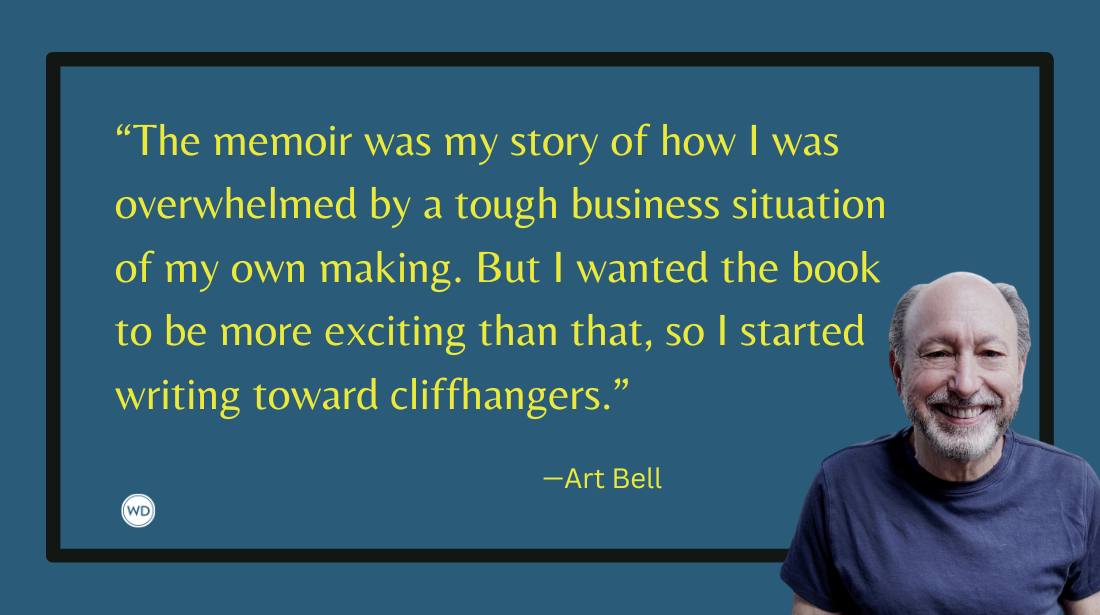5-Minute Memoir: Feeling the Words You Write
In this article from the October 2017 issue of Writer’s Digest, James C. Magruder illustrates the importance of humanizing the words you write.
Editor's Note: This article originally appeared in the October 2017 issue of Writer's Digest.
It’s 10 o’clock on Tuesday morning. Most people are hard at work trying to earn a living. I’m interviewing Katie, mother of three, who’s doing her best just to keep living. Katie is dying of ovarian cancer. She’s 27. She has three months left. Three months to agonize over what life might be like if her health care provider had approved appropriate chemotherapy treatment in a timely fashion. Katie’s goal now is to live till tomorrow.
For me, tomorrow is just another day—Wednesday. I’ll be writing a brochure for an architectural firm. On Thursday, I’ll write an ad for a Fortune 500 company. And on Friday, I’ll draft a speech for an executive. I’ve been hired by a local health care facility to write the story explaining how it helped prolong Katie’s life aft er a competing health care system failed her.
My tape recorder is running and as Katie answers my questions, her 4-year-old son, David, climbs into my lap and gives me a hug. Suddenly, I don’t feel like a writer. I feel as though I’m part of a similar story. My mind shoots back to a balmy June aft ernoon in 1965. My father just returned from the hospital. He calls his six children, ages 4 to 14, into his bedroom.
“Your mother passed away today,” he says. Panic seizes our hearts. My mother died aft er a short battle with cancer. She was 45. I was 11. I feel the eerie irony of David’s childhood colliding with mine. Tears well in my eyes as I know soon he will no longer enjoy the security of his mother’s embrace, the warmth of her touch, the power of her encouragement, even the fragrance of her perfume.
Back at my home office I write a lede for the story.
Cancer. Next to heart disease, it’s the leading cause of death in America. All of us know or love someone who has fallen prey to this impartial killer. If Katie Miller didn’t have to fight her former health care provider for an accurate diagnosis, she might not have to fight cancer today. Now, she’s not only fighting for her health, she’s fighting for time. This is her story.
This lede feels cold. Sterile. Empty. As I replay the interview, I sense I’m writing Katie’s story like one of my business articles—with my head. No heart.
I hammer out another lede, then another. Still sterile, unfeeling. Finally, I tap this out:
For Katie Miller, life is short. At 27, she’s just seen her last Christmas, her last wedding anniversary and her final birthday. She knows she will never see Jenny, her 6-year-old, finish the first grade. She knows she won’t be there when David, 4, loses his baby teeth. And she grieves knowing Joanna, 3, will never remember her.
Katie is dying of ovarian cancer. She has three months to live. But the real tragedy is it didn’t have to be this way.
I finish the article a few days later and send it to my client so Katie’s story can appear in a local publication.
Writing is a cerebral profession. Yet to tell Katie’s story, I needed to feel the words I wrote.
Perhaps Hemingway said it best: “A writer’s problem does not change. It’s always how to write truly and having found what is true, to project it in such a way that it becomes a part of the experience of the person who reads it.”
I suppose I could’ve learned how to feel the words I write from Hemingway—but Katie taught me first.
James C. Magruder is a writer living in Wisconsin. He is at work on his second novel, and he blogs about the writing life at thewritersrefuge.wordpress.com.








